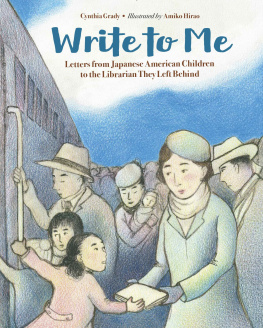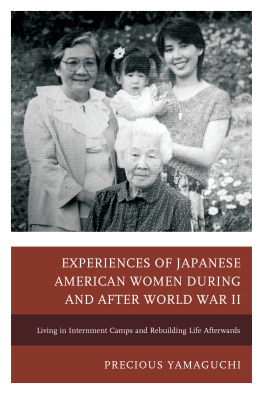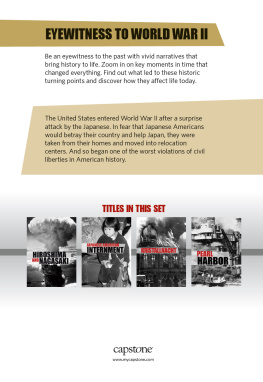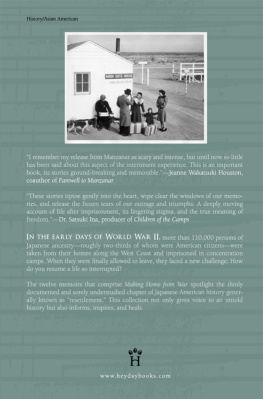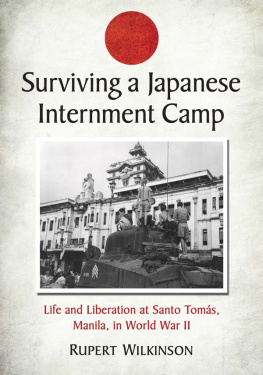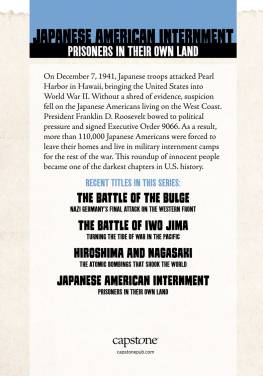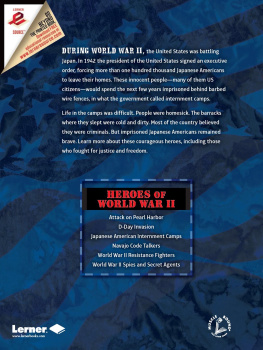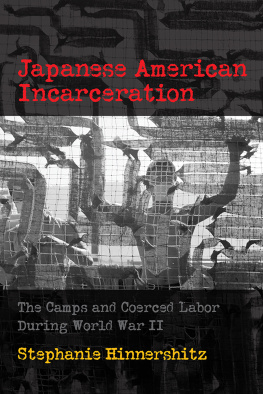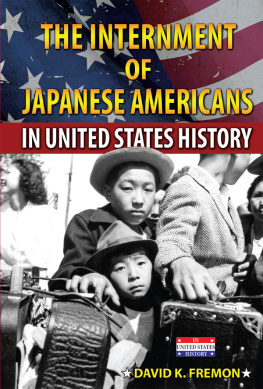President Franklin Delano
Roosevelt signs the declaration
of war against Japan.
Posted signs announce that
persons of Japanese ancestry
must leave their homes.
Families are allowed to bring only
what they can carry.
Those sent for imprisonment are
made to wear identification tags
while traveling.
Reading is food for the spirit
and immeasurable.
Clara E. Breed
K
atherine Tasaki returneda stack of books and
turned in her library card. Weve gotto move soon,
she said. All Japanese, you know.
Miss Breed did know. The US government thought
Katherine and all people of Japanese heritage living on the
West Coast could be dangerous. They looked like an
enemy of theUnited States in a complicated war halfway
around the world, so the government ordered that they
be imprisoned.
Miss Breed gave Katherine a stamped, addressed penny
postcard in exchange for her library card.Write to us,
Miss Breed said. Wellwant to know where you are.
At the train station, Miss Breed couldnt believe her
eyes. Hundreds of familieswere tagged as if they were
bundles of luggage. Soldiers with guns stood by.
When the children saw their librarian, they ran to her
with hugs and smiles aswarm as the San Diego sun.
Miss Breed gave away abagful of books. She handed out
more postcards.
When you have time, write to me. If you need
anything, just write.
The executive relocation order had come like a tidal
wave, sweeping away everybody in the neighborhood.
The library was a lonelier place.
Then one day Miss Breed found a penny postcard in
her mailbox.
Like shells tumbling through the tide, more
postcards arrived.
The cards were postmarked from Arcadia, California.
Now that Miss Breed knew where her friends were, she
wrote every week. She sent boxes brimming with books
and more stamped postcards.
And the children wrote back.
One weekend Miss Breed boarded a train to Arcadia.
The guards didnt let herhug the children or even shake
their hands. But they talked,and Miss Breed gave them
more books.
Thousands of people moved to San Diego for wartime
jobs. New children trickled into the library. Miss Breed was
no longer lonely, but she still missedher old friends.
Miss Breed wanted people across the country to know
about the treatment of Japanese Americans on the West
Coast. She wrote magazine articles. She wrote letters
asking for alibrary and school for the imprisoned children.
Miss Breed scoured newspapers, listened to the radio, and
attended rallies to learn moreabout the war.
Every night Miss Breed checked her mailbox. Her friends
had been transferred from the holding center in Arcadia to
a prison camp in Poston, Arizona.
The desert heat stunned them. Then came winter winds
and rain. People got sick.
Miss Breed sent seeds for planting, thread for sewing,
and soap for washing. She sentpipe cleaners, crepe paper,
pencils, and glue for making crafts.
The youngest children wrote to Miss Breed about what
they saw around them.
The older children wrote about their living conditions
and how they spent their days.
They wrote about beauty.
They wrote about fear.
They all waited for peace.
Finally the war ended. As the Japanese Americans were
released from each prison camp, theyhad todecide where to
go. Theyno longer had homes orfarms. Their shops,
restaurants, and other businesses were gone. Some feared
that they wouldnot be welcome in their old neighborhoods.
Some moved to otherpartsof the country for a fresh start.
But others, like Katherine Tasaki,
couldnt wait tocome home. Home to San
Diego andto their librarian. Home to their
friend Clara Breed.
Authors Note
Clara Estelle Breed was a librarian for forty-two
yearsfrom 1928 to 1970. She was the childrens
librarian at the East Branch of the SanDiego
County Library, which served many Japanese
American families when the United States
entered World War II. The Japanese navy
attacked the US Pacific fleet in Pearl Harbor,
Honolulu, Hawaii, on December 7, 1941. Many
Americans fearedincorrectlythat US citizens
of Japanese descent might be a threat to national
security. In February 1942 President Franklin
Roosevelt signed Executive Order 9066:
Resulting in the Relocation of Japanese, which
eventually imprisoned approximately 120,000
Japanese Americans from California, Oregon,
Washington, Hawaii, and parts of Arizona. More
than half were children. They had broken no laws
and werent charged with any crime. Much of
their land and belongings were sold.
Approximately thirty children corresponded
with their librarian. Miss Breeds letters, books,
and small gifts lifted their spirits during the three
years they were imprisoned in Poston, Arizona.
Years later, when Miss Breed packed to move
to a retirement home, she found the box of more
than 250 letters and postcards she received
during the war. She gave them to Elizabeth
Kikuchi Yamada, one of the children who had
written to her, now all grown up.
In 1991 Clara Breed was the honored guest at
a reunion for Japanese Americans who had been
imprisoned in Poston, Arizona. More than seven
hundred people gave her a standing ovation for
her kindness, friendship, love, and courage
during the war. Miss Breed died in 1994. She was
eighty-eight.
Ka therine Tasaki Segawa, Louise Ogawa, and
Clara Breed ( ), taken atthePostonIII
Reunion he ld in San Diego, Ca lifornia.
Notable Dates in Clara Breeds Life
(Adapted from Mary Yogi, Ch ronology of Clara Breed, re search proposal, UCLA, May 4, 2004, Clara Breed
Co llection, Japanese American National Museum, Los Angeles, California.)
1906 Born on March 19 in Fort Dodge, Iowa.
19101915 Moves to Brooklyn, New York; her
father works with new immigrants on Ellis Island.
1920 Mo ves with her mother and sister to San
Diego, California, after her father dies.
1927 Graduates from Pomona College.
1928 Earns her library science masters degree
from Western Reserve University (now Case
Western), in Ohio. Hired as a childrens
librarian at the East San Diego Branch of the San
Diego Public Library.
19291945 Works as the supervising childrens
librarian.
1942 Ma nagesthe San Diego Victory Book
Ca mpaign,a book drive forsoldiers. Stepsin as
acting chair ofthe American Library Associations
Ne wbery- Ca ldecott Awards Committee.
1942 Says good-bye at the train station to her
Japanese American patrons. Visits them at the
Sa nta Anita racetrack in Arcadia, California, then
at the prison camp in Poston, Arizona.
1943 Authors All But Blind in Library Journal
to discuss the war, relocation, children, and civil
liberties and rights. Read it online:
http://w ww .janm.org/exhibits/breed/art_t.htm
Authors Americans with the Wrong Ancestors
in the Horn Book Magazine . Read it online:
http:// ww w.hbook.com/1943/07/ ch oosing- bo oks/horn-
book- ma gazine/americans- wr ong-ancestors/
1946 Appointed city librarian.
1955 Na med San Diegos Woman of the Year.
1970 Retires in June.
1983 Publishes Turning the Pa ges: San Diego
Public Library History, 18821982 .
1991 Honored guest at a Poston reunion.
1994 Dies in her sleep on September 8.

